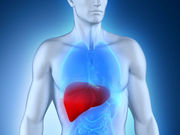Findings in postmenopausal women with nonalcoholic fatty liver disease
FRIDAY, March 18, 2016 (HealthDay News) — For postmenopausal women with nonalcoholic fatty liver disease (NAFLD), longer duration of estrogen deficiency is associated with increased odds of having more severe fibrosis, according to a study published online Feb. 26 in Hepatology.
Jagpal Singh Klair, M.D., from the University of Arkansas for Medical Sciences in Little Rock, and colleagues examined the correlations of age at menopause and time from menopause with fibrosis severity in postmenopausal women with NAFLD. Data were included for 488 postmenopausal women with histologic diagnosis of NAFLD.
The researchers found that women with premature menopause (age at menopause of <40 years) were younger at study enrollment and more frequently used hormone replacement therapy. Premature menopause correlated with increased likelihood of having more severe fibrosis after adjustment for multiple confounding variables, including age at study enrollment, race, and hormone replacement therapy (adjusted cumulative odds ratio, 1.9; P = 0.001). Time from menopause correlated directly with increased likelihood of having more severe fibrosis (adjusted cumulative odds ratio for five-year unit, 1.2; P = 0.002).
“Duration of estrogen deficiency in postmenopausal state confers fibrosis risk among post-menopausal women with NAFLD,” the authors write.
Copyright © 2016 HealthDay. All rights reserved.








